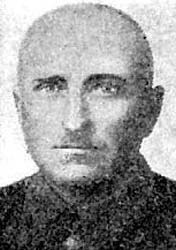Vasilij Kvachantiradze
|
Vasilij Shalvovich Kvachantiradze
|
|
|---|---|
 |
|
| Born | January 4, 1907 Democratic Republic of Georgia |
| Died | Script error: The function "death_date_and_age" does not exist. Georgian Soviet Socialist Republic |
| Allegiance | |
| Service/ |
Soviet Army |
| Years of service | 1941–1945 |
| Rank | Sergeant major (Starshina) |
| Unit | 259th Infantry Regiment of the 179th Infantry Division, Soviet 43rd army |
| Commands held | forward observer unit, sniper unit |
| Battles/wars | World War II: |
| Awards | |
Vasilij (Basil) Shalvovich Kvachantiradze (Georgian: ვასილ შალვას ძე კვაჭანტირაძე; January 1907 – February 9, 1950) was a top Soviet sniper during World War II. He entered Red Army service in 1941 and is credited with confirmed kills numbering at least 215 officers and soldiers of the German Wehrmacht during the Vitebsk-Orsha Offensive.[1][2] and around 534 confirmed kills total during Operation Bagration or during the war.[3][4][5]
Early life
Kvachantiradze was born in a village in the Georgian region of Guria and grew up within a peasant family. He spent time working and assisting on the farm of his parents until he became a member of the local Communist Party of the Soviet Union which brought him good chances for further educating himself on the matters of agriculture. However, his idea of travelling to Moscow for starting up a business career fell short when the war started.
During the war
In 1941 Kvachantiradze joined the Red Army. At the beginning, he was set into a lead forward observer unit of the Soviet 43rd Army, 179th Infantry Division and quickly proved himself to be an extraordinary marksman with simple ironsighted rifles. Soon he was set in as a sniper of the same detachment's, 259th infantry Regiment and scored his first kills. During the entire period from 1941 to 1945, he scored around 215 to 534 kills,[1][2][3][4] with the latter one probably counting as hits, not necessarily fatal shots and the 215 as confirmed fatalities, but only during a single offensive. While the greater number is in fact also referred as to confirmed kills by different sources as total amount of fatal shots. His victims were mainly officers but also soldiers, including enemy sharpshooters and snipers. During the Soviet offensive at Vitebsk in 1944, Kvachantiradze detachment was encircled by counterattacking German units in the village of Shumilino and cut off from the rest of the regiment, but only for a short time. Kvachantiradze managed to improvise traps and ambushes without exposing his position a single time. The morale of the German soldiers was wavering by deadly sniper fire. Alone there, Kvachantiradze scored around 44-60 kills.[3] At that point, the German infantry was too abstinent and careful, that the fear of being caught into a sniper trap influenced the behaviour and made it possible for the defenders to prevent the Germans capturing the village and creating a defensive line. Thus a Soviet counterattack was made possible. What did happen, when a combined Soviet infantry and mechanized assault could break through the circle easily and managed to defeat the Germans.
Awards
For his formidable efforts during the war, Kvachantiradze was awarded Hero of the Soviet Union, Order of Lenin twice gold star medal, Order of the Red Banner twice, Order of the Patriotic War twice and the Order of the Red Star.
After the war
Kvachantiradze left the army in 1945 and became chairman in the Supreme Soviet Presidium USSR of the Soviet Kolkhoz. Vasilij Shalvovich Kvachantiradze died on February 9, 1950 at the age of 43.
See also
References
- ↑ 1.0 1.1 Lua error in package.lua at line 80: module 'strict' not found.
- ↑ 2.0 2.1 Lua error in package.lua at line 80: module 'strict' not found.
- ↑ 3.0 3.1 3.2 Lua error in package.lua at line 80: module 'strict' not found.
- ↑ 4.0 4.1 Lua error in package.lua at line 80: module 'strict' not found.
- ↑ Lua error in package.lua at line 80: module 'strict' not found.
- Heroes of the Soviet Union
- Articles containing Georgian-language text
- Military snipers
- Soviet military personnel of World War II
- People of World War II from Georgia (country)
- 1907 births
- 1950 deaths
- People from Guria
- Recipients of the Order of Lenin
- Recipients of the Order of the Red Banner
- Recipients of the Order of the Patriotic War, 2nd class
- Recipients of the Order of the Red Star